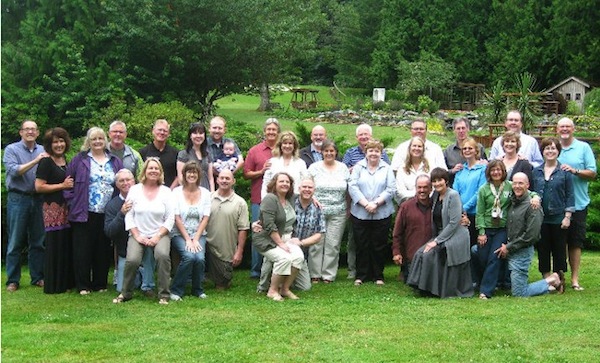I just returned from a powerful and refreshing weekend spent with our GTN staff, who traveled from all across the country to attend our annual staff retreat. The transformative work of God’s Spirit was so evident in the stories that were shared. God is truly doing some amazing things around the world in and through our GTN staff! I am humbled that, by His grace, we get to be a part of this work.
On Saturday morning, I began our time together by sharing an overview of this past year and our vision for the coming year (and decade). Part of the morning was spent “unpacking” one of GTN’s seven key values: the idea of being “grace-oriented” in all that we do.
By “grace-oriented,” we mean…
We desire to be an organization that emphasizes grace, both in salvation and in how we live in relationship with one another. We want to be the type of people who are grace-oriented in both our personal and ministry spheres. We recognize that legalism kills, but grace gives life. We desire to be known as an organization that has an unwavering commitment to the grace of God in salvation (we are saved by grace alone, through faith alone, in Christ alone), as well as a grace orientation in how we interact in our personal relationships with one another (Romans 14).
I wrote these seven values (as well as most of the thoughts that are written below) back in the Summer of 2004 when GTN was birthed. These values have guided us as an organization through the years. Each year at our staff retreat I like to reiterate our commitment to these values, especially to the value of living a “grace-oriented” life.
I thought I would share with you a portion of my notes from this past weekend on living “grace-oriented.” For those of you that know me, you will realize quickly that these thoughts are not new – I have been sharing them (and trying to live them personally) for most of my ministry life.
There is nothing I would love more than to have my epitaph read, “Here lies a man who never ceased to be amazed at the grace of God in his own life, and therefore tried to always give the same grace to all he met.” I hope these thoughts will be an encouragement and blessing in your life.
Here are my notes on living “grace-oriented”…
The Environment of GTN
One of the things that I am deeply committed to is creating an environment within GTN that is filled with grace (first and foremost) and secondarily, allowing this grace to overflow with genuine partnership (i.e. unselfishness) in how we relate to the larger body of Christ around the world!
Here is how I see a “grace-orientation” being lived out among our team of fellow leaders (servants).
To live “grace-oriented” means that we…
Choose to “major on the majors and minor on the minors.” Satan loves nothing more than to get Christians to either “major on minors” or “minor on majors.” Either way, he has won the battle.
To clarify, lest I be misunderstood: In no way am I suggesting that we “throw core doctrines to the wind” and embrace as partners in ministry anyone and everyone who claims the title “Christian” (or even “evangelical Christian” – aka Rob Bell, Brian McLaren, etc.). I’m not downplaying the vital and foundational place that correct “sound” doctrine plays in our lives and ministries. I am simply saying that under the umbrella that I refer to as “conservative evangelical Christianity,” let’s keep the big picture in view and not splinter or divide over secondary (or tertiary) doctrinal issues (or worse, methodological issues).
A long time missionary friend of mine told me years ago (when I was still pastoring), that the one thing that broke his heart more than anything else was how bitterly divisive “missions people” are – and the heated arguments he had experienced out on the field weren’t over doctrinal issues, but rather methodological issues! They were missionaries who had graduated from the same seminary as my friend and who worked for the same mission agency, but who would no longer work with him – or anyone in his group simply because their approaches were different. It wasn’t like my friend was doing something that was harming the work in that particular country, let alone doing irreparable damage (it was actually very good and effective work in my opinion).
To clarify again: I’m also not saying that methodological issues are of no importance. They are. Some methods are better than others. But let’s not throw stones at those that “do ministry” differently than we do. Let’s give grace as they grow and learn – just as we want and need grace as we grow and learn (I’m certainly thankful God didn’t “throw me out of ministry” because of “how” I was doing it – which I later learned was probably not the best way of doing it). If we come across a missionary (or other partner in ministry) that we believe is using a method or strategy that is genuinely harming the long term health and effectiveness of the ministry in that region, graciously sit down with that person and try to share with him (or her) some things that you have learned over the years about the most effective ways of doing ministry. Always approach the person and situation with humility, grace and patience.
Being “grace-oriented” means that we choose to believe the best about one another and give each other the benefit of the doubt, rather than (as some organizations do) live in a constant state of skepticism and cynicism about fellow staff member’s motives, etc. Cultures of skepticism and cynicism are death-inducing, rather than life-giving (1 Cor. 4:5).
Being “grace-oriented” means that we choose to “above all, keep loving one another earnestly, since love covers a multitude of sins” (1 Peter 4:8). You can’t live in relationship with another person for very long without hurts and sins occurring. We take Jesus seriously when He said, “By this will all men know that you are my disciples, by your love for one another…” (John 13:34-35). We really believe the Apostle Paul when he said, “Now these three remain: faith, hope and love. But the greatest of these is love” (1 Corinthians 13:13). And the Apostle John where he writes, “Anyone who does not love does not know God, because God is love.” (1 John 4:8)
Philippians 2:1-5 should describe how we live in relationship with one another and other ministries…
“If you’ve gotten anything at all out of following Christ, if his love has made any difference in your life, if being in a community of the Spirit means anything to you, if you have a heart, if you care— then do me a favor:
Agree with each other, love each other, be deep-spirited friends. Don’t push your way to the front; don’t sweet-talk your way to the top. Put yourself aside, and help others get ahead. Don’t be obsessed with getting your own advantage. Forget yourselves long enough to lend a helping hand. Think of yourselves the way Christ Jesus thought of himself.” (paraphrase of this passage from The Message)
Being “grace-oriented” means that we choose to value and always practice humility in how we treat one another, as well as the pastors and leaders that we serve around the world (Ephesians 4:1-2). Our desire is that we as a staff would be the direct opposite of your average “pastors’ conference” here in the U.S., where there always seems to be a game of “one-ups-manship” going on, with every pastor trying to impress all of the other pastors about how “wonderful” his ministry is.
Over the years, it has always been sad for me to see how (many times) pastors will come to a particular conference and immediately try to determine the “pecking order” (and where they fit in to that order…it’s usually by the size or influence of a pastor’s church or ministry). It’s just like in the business world where an individual enters a room and immediately assesses who the “big dog” is in the room (and how close they are to that “big dog”). Surely this breaks God’s heart!
Jesus said, “You know that the rulers of the Gentiles lord it over them, and their great ones exercise authority over them. It shall not be so among you. But whoever would be great among you must be your servant, and whoever would be first among you must be your slave, even as the Son of Man came not to be served but to serve, and to give his life as a ransom for many.” (Matthew 20:25-28)
Our desire is that we would be the kind of staff that models the “humble, servant leadership” that Jesus would if He were on our staff.
We also choose to “rejoice with those who rejoice and weep with those who weep” (Romans 12:15). When another staff member (or ministry) is blessed, we genuinely rejoice with them and don’t allow jealousy to creep into our hearts and minds. When another staff member (or ministry) receives an $80,000 gift and we only receive an $800 one, we genuinely rejoice with them. Also, when another staff member (or ministry) is going through a hard time, we “weep with them.” We put ourselves in their situation and imagine how it would feel if we were facing what they are facing.
Being “grace-oriented” means that we choose to differentiate between personal convictions and God’s clear black-and-white moral and ethical imperatives (Romans 14). We choose to give respect and grace to fellow staff members who approach ministry a bit differently than we do.
Nothing has shocked me or broken my heart more over the years than the narrow, and at times rabid, divisiveness between mission organizations (and groups of churches) around the world. For some reason, people involved in missions seem to have an even greater propensity to slice and dice (with the tiniest and sharpest razor knife) every aspect of theology and, probably even more so, missions methodology. Everyone seems to think that they know how to do it best and therefore, everyone else is either “wrong” or “unenlightened.” Some of these people seem to wake up in the morning with the express purpose of looking for a new “theological or methodological” fight. All the while, people by the millions are dying without Christ!
It has broken my heart as I have witnessed their unwillingness to work together and be “Kingdom-minded” in their approach. The world looks on and sees these bitter fights and wants no part of this “Jesus.” Surely God’s heart breaks and heaven weeps. Our hearts should break for the things that break the heart of God. Being “grace-oriented” means that we choose to value appropriate diversity, not only in the Body of Christ (as the Apostle Paul says in 1 Corinthians 12 and Ephesians 4), but also with ministry methods and ideas.
We seek to learn from one another in a spirit of humility, respect and grace. We genuinely listen to others who may do ministry differently than we do and seek to learn whatever possible that fits with how God has made us and what He has called us to do, as well as where He has called us to do it.
When we do disagree with another ministry partner (either theologically, philosophically or methodologically), we do so with the utmost of grace and humility.
“…that they may all be one, just as you, Father, are in me, and I in you, that they also may be in us, so that the world may believe that you have sent me. The glory that you have given me I have given to them, that they may be one even as we are one, I in them and you in me, that they may become perfectly one, so that the world may know that you sent me and loved them even as you loved me.”
(John 17:21-23)
“A new commandment I give to you, that you love one another: just as I have loved you, you also are to love one another. By this all people will know that you are my disciples, if you have love for one another.”
(John 13:34-35)
“Let no corrupting talk come out of your mouth, but only such as is good for building up, as fits the occasion, that it may give grace to those who hear.”
(Ephesians 4:29)



